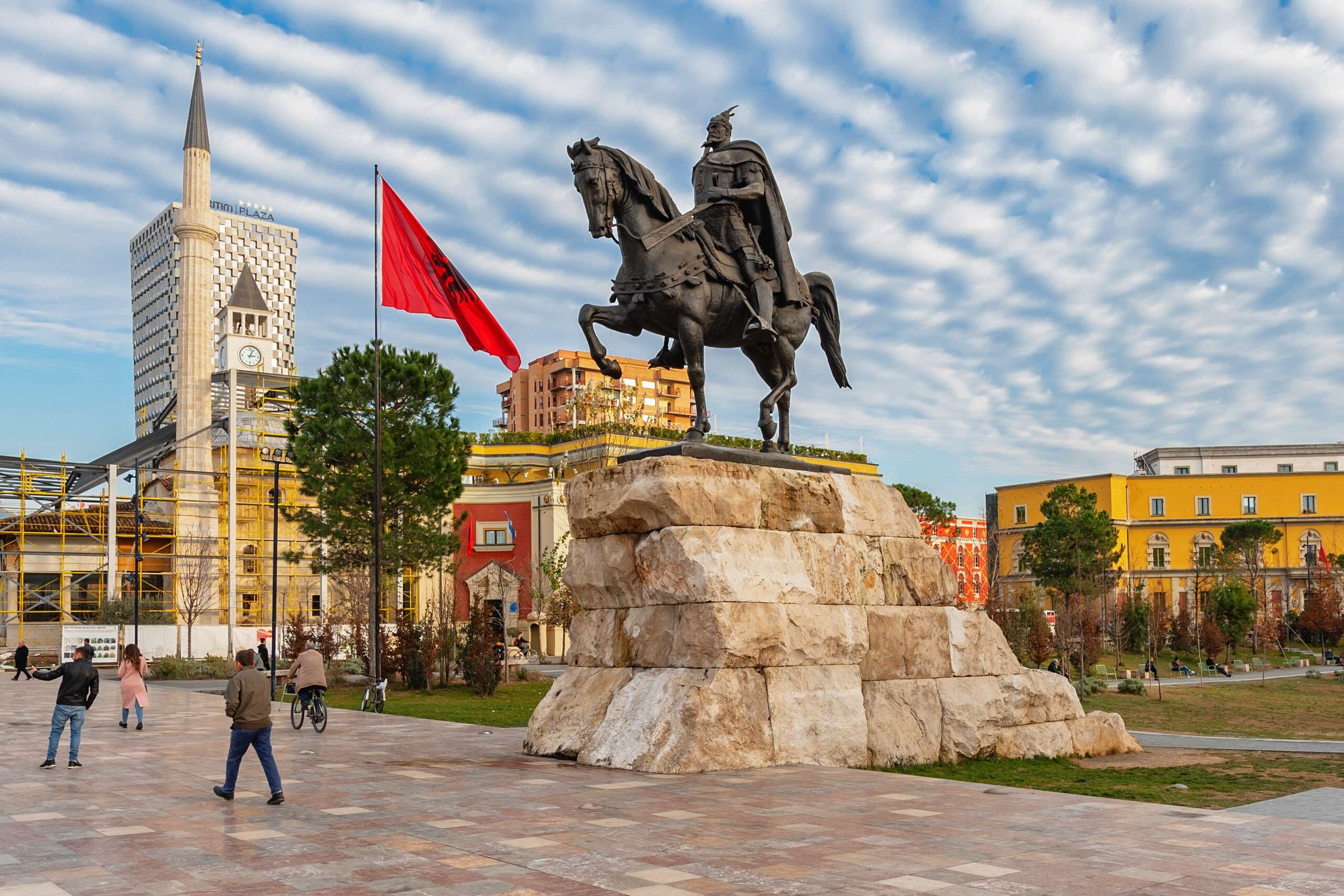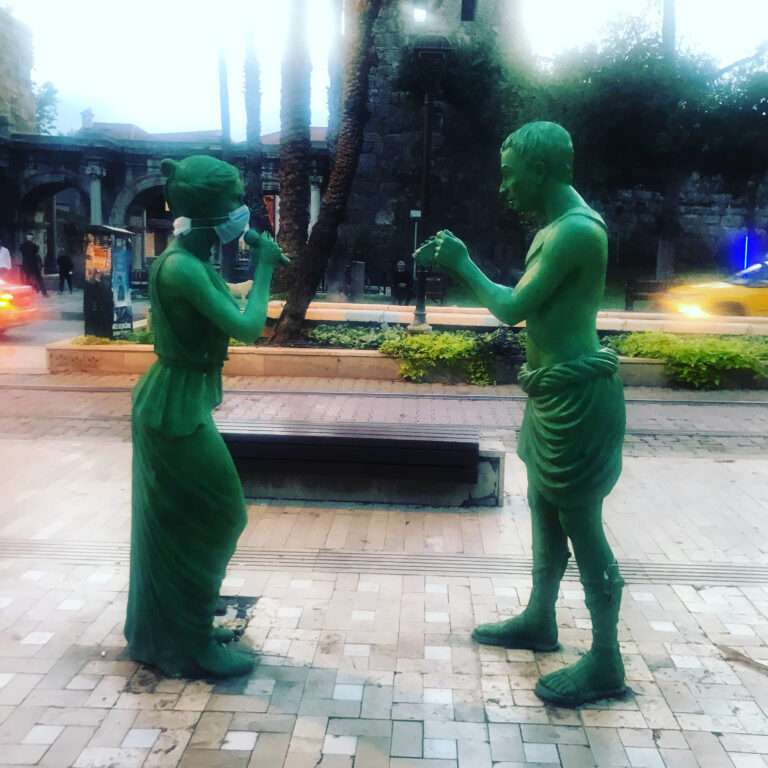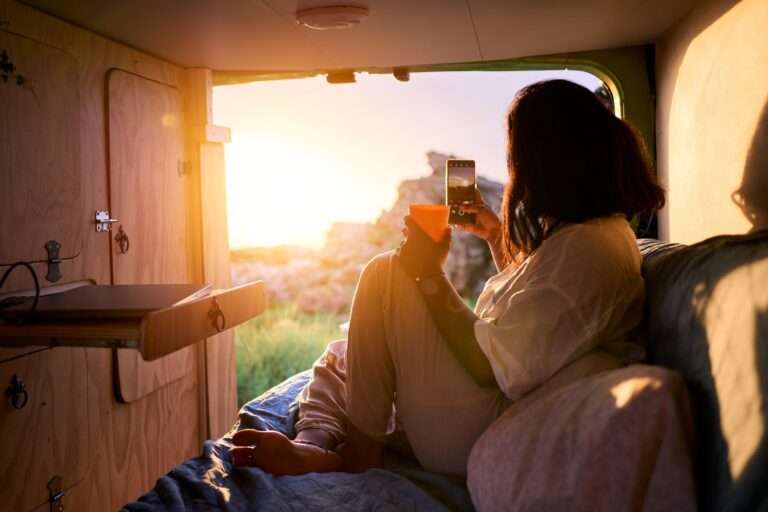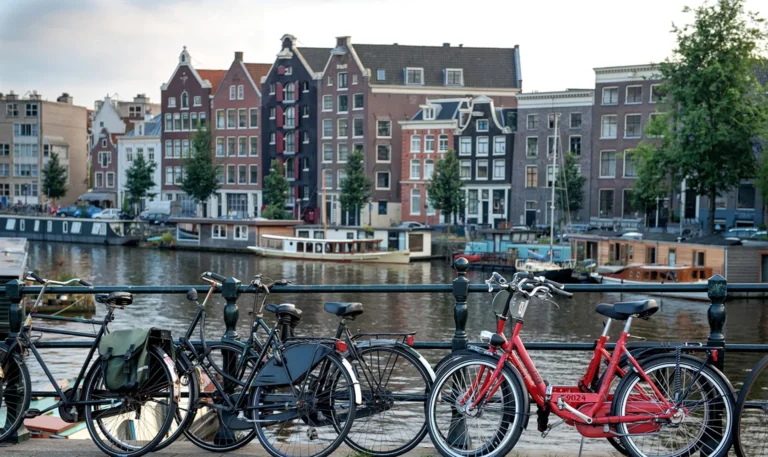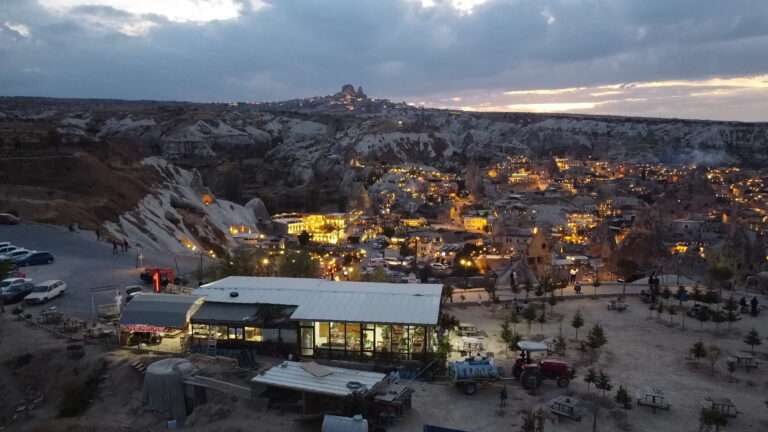Albania might not be the first place that comes to mind when you think of digital nomad destinations, but this underrated Balkan country has so much to offer. From the capital city of Tirana to coastal towns, Albania is quickly becoming a favorite among remote workers. Whether you’re drawn to the capital city of Tirana, the beaches along the Albanian Riviera, or the sleepy mountain towns, you’ll find plenty of reasons to stay longer than you planned. I spent a month in Albania working from my laptop the entire time. In this guide, I will cover everything you need to know about being a digital nomad in Albania.
Can I Work Remotely from Albania?
Absolutely! Albania is a great place to work remotely. The country is gradually building its infrastructure to support digital nomads, with a growing number of coworking spaces and reliable internet connections in major cities. Plus, the laid-back lifestyle, low cost of living, and beautiful surroundings make it a perfect spot to get work done while enjoying life.
Can I Be a Digital Nomad in Albania?
Yes, you can definitely be a digital nomad in Albania. The country is increasingly becoming popular among digital nomads for its affordable living, beautiful nature, and rich culture. While Albania may not be as well-known as some other digital nomad hubs, it offers a unique and authentic experience that’s hard to find elsewhere. Whether you’re staying for a few weeks or several months, you’ll find plenty of like-minded individuals and a supportive community here.
Does Albania Have a Digital Nomad Visa?
As of now, Albania does not have a specific digital nomad visa, but it does offer a unique permit known as the “Unique Permit” (Leje e veçantë). This permit allows foreign nationals, including digital nomads, to live and work in Albania for up to one year, with the possibility of renewal. The process is relatively straightforward, and the requirements are not as stringent as in some other countries. If you’re planning to stay longer than the standard 90-day tourist visa allows, this is a great option to consider. U.S. citizens may stay in the Republic of Albania for up to one year with only our passports.
Where is Albania Located?
Albania is located in Southeastern Europe, occupying a prime position in the western part of the Balkan Peninsula. It shares borders with Montenegro to the northwest, Kosovo to the northeast, North Macedonia to the east, and Greece to the south. To the west, Albania has a coastline along the Adriatic Sea, and to the southwest, it borders the Ionian Sea. This location not only gives Albania a variety of landscapes but also makes Albania the perfect base for exploring other Balkan countries and the Mediterranean.
Is Albania Part of Europe?
Yes, Albania is an part of Europe, both geographically and culturally. While it is not a member of the European Union, Albania has been a candidate for EU membership since 2014 and has made significant progress towards integration. The country is also a member of several international organizations, including NATO and the United Nations, further solidifying its position within the European and global community. For digital nomads, this means you’ll find many of the conveniences associated with European living, along with the unique cultural charm of the Balkans.
What is the Best Way to Get to Albania from London?
The most convenient way to reach Albania from London is by flying directly to Tirana, the capital of Albania. Several airlines, including British Airways and Wizz Air, offer direct flights from London to Tirana International Airport Nënë Tereza (TIA). The flight duration is approximately three hours, making it a relatively quick journey. Upon arrival in Tirana, you can easily explore the rest of the country using buses, rental cars, or domestic flights. If you prefer a more scenic route, you could also consider traveling by train or bus from neighboring countries, such as Greece or Montenegro, though this option will take longer.
What’s the Closest Airport to Albania?
The closest and main international airport in Albania is Tirana International Airport Nënë Tereza (TIA), also known as Rinas Airport. It’s located about 17 kilometers (10.5 miles) northwest of Tirana, the capital city, and serves as the primary gateway to the country for international travelers.
What Language is Spoken in Albania?
The official language of Albania is Albanian. The language is unique and has two main dialects: Gheg in the north and Tosk in the south. While Albanian is the primary language spoken, many Albanians, especially in urban areas and tourist spots, speak English, Italian, or Greek. Learning a few basic Albanian phrases will definitely earn you some brownie points with the locals!
Is Albania Worth Visiting?
Without a doubt, Albania is worth visiting! This small country has natural beauty, history, and warm hospitality. From the beaches of the Albanian Riviera to the UNESCO World Heritage sites like Berat and Gjirokastër, there’s something for everyone in Albania. Whether you’re into hiking, history, or simply soaking up the sun, you’ll find plenty to keep you entertained.
What is the best month to visit Albania?
The best month to visit Albania depends on what you’re looking to do. If you’re a beach lover, the summer months of June to September are ideal, with warm weather and plenty of sunshine. For those who prefer cooler temperatures and fewer crowds, May and October are great for exploring the countryside and cultural sites. Winter (December to February) is perfect if you’re into skiing or want to experience a quieter, more relaxed Albania.
How Long Should I Stay in Albania?
The length of your stay in Albania really depends on your interests and work commitments. However, a stay of at least two weeks is recommended to get a good feel for the country. If you’re working remotely, you might find yourself wanting to extend your stay, as many digital nomads do. The country’s relaxed pace of life, combined with its affordability, makes it easy to settle in for a longer period.
What is Albania Weather Like?
Albania has a Mediterranean climate, with hot, dry summers and mild, wet winters. Coastal areas experience warmer temperatures, while the mountainous regions can be cooler. During the summer, temperatures can reach up to 30°C (86°F) or higher, especially in July and August. In the winter, temperatures in the mountains can drop below freezing, making it a great time to visit if you enjoy skiing or snowboarding.
Is Albania Safe for Digital Nomads?
Albania is generally safe for digital nomads, including solo female travelers. I was alone during my time in Albania and I had no issues. The crime rate is relatively low, and violent crime is rare. Petty theft can occur in busy areas, so it’s important to stay vigilant, especially in tourist hotspots. Albanians are known for their hospitality, and you’ll often find locals going out of their way to help you. As with any destination, it’s always a good idea to stay aware of your surroundings and take standard precautions.
Is Albania Expensive for Digital Nomads?
One of the biggest draws of Albania for digital nomads is its affordability. The cost of living in Albania is significantly lower than in many Western European countries. You can find comfortable accommodation, eat out at restaurants, and enjoy various activities without breaking the bank. While prices can be higher in touristy areas, overall, Albania offers excellent value for money for digital nomads.
What currency is used in Albania?
The official currency of Albania is the Albanian lek (ALL). Euros are also widely accepted in many tourist areas, but it’s best to have some lek on hand for smaller purchases, especially in more rural areas. ATMs are available in cities and towns, and credit cards are accepted in most hotels, restaurants, and shops.
Intercity Travel: Getting around Albania
Getting around in Albania is fairly straightforward, though public transportation can be a bit unpredictable at times. Here’s a more detailed look at your options:
- Buses: Buses are the most common and affordable way to travel between cities. They are reliable and cover most destinations. Tirana’s main bus terminal, Regional Bus Terminal, connects to major cities like Durrës, Vlorë, and Shkodër. Prices are reasonable, and schedules are frequent, making it a convenient option for travelers.
- Minibuses (Furgons): These are faster than regular buses and more flexible in terms of routes. Minibuses can be found in most towns and cities and are a great option for shorter distances. They don’t have fixed schedules and leave when full, so they can be a bit unpredictable.
- Trains: While the railway network in Albania isn’t extensive, it’s a cheap and scenic way to travel between certain cities, such as Tirana and Durrës. Trains are slower than buses and less frequent, but they offer a unique view of the countryside.
- Car Rentals: Renting a car is ideal for exploring at your own pace. Major cities have several car rental agencies, and driving allows you to reach remote and beautiful areas not accessible by public transport. However, be prepared for challenging driving conditions, especially on rural roads.
- Taxis and Ride-Sharing: Taxis are widely available in cities and can be a convenient way to get around. Make sure to negotiate the fare before starting your journey. Ride-sharing services like MerrTaxi are also available in Tirana.
- Bicycles and Scooters: For shorter distances, especially in flat areas like Tirana, renting a bicycle or scooter is a fun and eco-friendly way to get around. Several rental shops offer affordable rates.
Accommodation in Albania
Albania offers a range of accommodation options to suit different budgets and preferences. Here are some choices:
- Hostels: Great for budget travelers. Check out Tirana Backpacker Hostel and Milingona City Center Hostel in Tirana.
- Budget Hotels: Affordable and comfortable. Try Hotel Nobel Tirana or Hotel Baron.
- Mid-Level Hotels: For a bit more comfort, consider The Plaza Tirana or Dinasty Hotel.
- Luxury Hotels: If you want to splurge, the Rogner Hotel Tirana and Maritim Hotel Plaza Tirana are top picks.
- Serviced Apartments: Ideal for longer stays with more amenities. Tirana Apartments and Te Stela Resort offer great options.
- Co-living Spaces: Perfect for digital nomads. Spaces like Workation Albania in Tirana provide both accommodation and coworking facilities.
Coworking in Albania
Albania’s coworking scene is growing, particularly in Tirana. Here are some top spots:
- Innospace: A modern space in the heart of Tirana with excellent facilities and a vibrant community.
- Destil: A creative hub that combines coworking with cultural events and a cool café.
- Ofiçina: Offers a professional environment with all the amenities you need to stay productive.
- Coolab: Located in the Blloku area, it’s perfect for networking and working in a lively neighborhood.
- Workspace.al: Provides a range of workspaces and is known for its friendly atmosphere.
Dining in Albania
Albanian cuisine is delicious and varied, influenced by Mediterranean, Balkan, and Ottoman flavors. Here are some must-try dining options:
- Traditional Restaurants: Oda and Era in Tirana offer authentic Albanian dishes like Tavë Kosi and Fërgesë.
- Seafood: The coastal towns like Durrës and Vlorë are perfect for fresh seafood. Try the fish at Restaurant Mullixhiu in Tirana.
- Street Food: Don’t miss out on Byrek (savory pastry) and Qofte (meatballs) from local vendors.
- Cafés: Albania has a thriving café culture. Komiteti and Mulliri Vjeter are popular spots in Tirana.
- International Cuisine: For a break from local food, try Salt for Mediterranean flavors or Padam Boutique Hotel & Restaurant for fine dining.
Pros And Cons Of Being A Digital Nomad In Albania
Pros:
- Affordable Cost of Living: Albania is one of the most budget-friendly countries in Europe.
- Scenic Beauty: From mountains to beaches, Albania has diverse and stunning landscapes.
- Friendly Locals: Albanians are known for their hospitality and friendliness towards foreigners.
- Rich History: Explore ancient ruins, castles, and museums showcasing Albania’s fascinating past.
- Growing Digital Infrastructure: Reliable internet and an increasing number of coworking spaces.
Cons:
- Language Barrier: English is not widely spoken outside major cities.
- Infrastructure: While improving, some areas still have issues with roads and public services.
- Limited International Flights: Fewer direct flights compared to other European countries.
- Visa Policies: Check visa requirements, as they can be strict depending on your nationality.
- Healthcare: Public healthcare can be lacking; private healthcare is available but can be expensive.
FAQs About Being A Digital Nomad In Albania
Do I need a visa to stay in Albania?
Depending on your nationality, you may need a visa to stay in Albania. Citizens of the EU, UK,, and several other countries can stay visa-free for up to 90 days within a 180-day period. American can stay for up to one year with just our passport. Always check the latest visa requirements before traveling to make sure you are complying with local regulations.
How reliable is the internet in Albania?
Internet quality has improved significantly, especially in major cities. Most coworking spaces and cafes offer reliable Wi-Fi. However, in more rural areas, the connection might be slower or less stable.
Is Albania safe for digital nomads?
Yes, Albania is generally safe for digital nomads. As with any country, it’s essential to take standard precautions, especially in unfamiliar areas. The crime rate is relatively low, but it’s always wise to stay vigilant and protect your belongings.
What language is spoken in Albania?
The official language of Albania is Albanian. While English is spoken in tourist areas and by younger generations, learning a few basic phrases in Albanian can be helpful and appreciated by the locals.
How affordable is Albania compared to other European countries?
Albania is very affordable, with lower costs for accommodation, food, and transportation compared to Western Europe. You can enjoy a comfortable lifestyle without breaking the bank, making it an excellent destination for budget-conscious digital nomads.
Can I use my credit/debit card in Albania?
Credit and debit cards are widely accepted in cities, but it’s a good idea to carry cash, especially in rural areas where card facilities might be limited. ATMs are readily available in urban areas for withdrawing local currency.
What’s the best way to get around in Tirana?
Tirana is quite walkable, and taxis are affordable and readily available. Public buses operate throughout the city, but they can be crowded during peak times. Bicycles and electric scooters are also popular for short distances.
Are there many expats or digital nomads in Albania?
The community of expats and digital nomads in Albania is growing, particularly in Tirana. Joining local expat groups, attending networking events, and utilizing coworking spaces can help you connect with like-minded individuals.
How’s the healthcare in Albania?
Public healthcare is available but may not meet Western standards. Private healthcare facilities offer better services but can be more expensive. It’s recommended to have comprehensive travel insurance to cover any medical needs during your stay.
Is it easy to find long-term accommodation in Albania?
Yes, finding long-term accommodation in Albania, especially in cities like Tirana, is relatively easy. There are plenty of apartments for rent, and platforms like Airbnb can help you find suitable long-term stays.
Can I drive in Albania with a foreign license?
Yes, you can drive in Albania with a valid international driving permit (IDP) or a foreign driver’s license. However, it’s advisable to familiarize yourself with local driving laws and conditions, as they can differ from those in your home country.
How is the public transportation system in Albania?
The public transportation system in Albania includes buses, minibuses (furgons), and a limited railway network. Buses and furgons are the most common and affordable ways to travel between cities, while trains offer a scenic but slower alternative.
What kind of work visa do I need for Albania?
If you are not American and plan to stay longer than 90 days or work formally in Albania, you will need to apply for a residence permit and possibly a work visa. The requirements can vary, so it’s essential to check with the Albanian embassy or consulate for the most accurate information.
Are there any coworking spaces in smaller towns?
While the majority of coworking spaces are concentrated in Tirana, there are a few emerging in smaller towns and coastal areas. It’s best to research specific locations in advance or consider alternative work environments like cafes and libraries.
What are the popular digital nomad destinations in Albania?
Tirana is the most popular destination for digital nomads due to its amenities and coworking spaces. Coastal towns like Durrës and Vlorë are also becoming popular for their beautiful beaches and relaxed atmosphere.
How can I meet other digital nomads in Albania?
Joining online communities, attending local meetups, and participating in coworking events are great ways to meet other digital nomads. Facebook groups and platforms like Meetup can help you find relevant events and groups.
Is Albania a good place for nature lovers?
Absolutely! Albania boasts stunning natural landscapes, including the Albanian Alps, pristine beaches along the Ionian and Adriatic Seas, and picturesque national parks like Llogara and Theth. Nature lovers will find plenty of outdoor activities to enjoy.
Can I find vegetarian or vegan food in Albania?
While traditional Albanian cuisine is meat-heavy, vegetarian and vegan options are increasingly available, especially in Tirana and other major cities. Many restaurants offer plant-based dishes, and there are a few dedicated vegetarian and vegan eateries.
What cultural experiences should I not miss in Albania?
Don’t miss exploring Albania’s rich cultural heritage, including the ancient ruins of Butrint, the UNESCO World Heritage site of Gjirokastër, and the vibrant Blloku district in Tirana. Traditional music and dance performances are also a highlight.
How is the weather in Albania throughout the year?
Albania has a Mediterranean climate with hot, dry summers and mild, wet winters. Coastal areas tend to be warmer, while inland regions can experience more significant temperature variations. Spring and autumn offer pleasant weather for travel.
Are there any language courses available for learning Albanian?
Yes, several language schools and private tutors offer Albanian language courses in major cities like Tirana. Additionally, online resources and language exchange programs can help you learn the basics and improve your skills.
What is the tipping culture in Albania?
Tipping is appreciated but not obligatory in Albania. In restaurants, a tip of 5-10% of the bill is customary for good service. For other services, such as taxis or hairdressers, rounding up the bill or leaving a small tip is also common.
How easy is it to travel to neighboring countries from Albania?
Albania’s location in the Balkans makes it easy to travel to neighboring countries like Greece, Montenegro, Kosovo, and North Macedonia. Buses and car rentals are common ways to cross borders, and there are ferry connections to Italy.
What are the main mobile network providers in Albania?
The main mobile network providers in Albania are Vodafone, One, and ALBtelecom. They offer a range of prepaid and postpaid plans with good coverage in urban areas and popular tourist destinations.
How can I handle emergency situations in Albania?
In case of emergency, you can dial 112 for police, fire, and medical services. It’s advisable to know the location of the nearest hospital and have the contact details of your embassy or consulate. Keeping important documents and emergency contacts accessible is also crucial.
Final Thoughts
Albania offers a unique and enriching experience for digital nomads. With its affordable living costs, beautiful scenery, and growing digital infrastructure, it’s definitely worth considering as your next destination. From the vibrant streets of Tirana to the serene beaches of the Ionian coast, Albania has something for every digital nomad. Embrace the local culture, explore the stunning landscapes, and enjoy the hospitality of the Albanian people. Whether you’re staying for a few months or making it your long-term base, Albania is sure to leave a lasting impression.
Happy travels!
